Abstract
Plasma levels of antibodies against phosphatidylinositol (PI), phosphatidylcholine (PC) and cardiolipin (CL) were measured by enzyme-linked immunosorbent assay (ELISA) in patients from malaria endemic area of Sudan and The Gambia. Some Sudanese adults produced IgM antibodies against all three types of phospholipids (PL) during an acute Plasmodium falciparum infection. The anti-PL antibody titre returned to preinfection levels in most of the donors 30 days after the disease episode. IgG titres against PI, PC and CL were low. In Gambian children with malaria, IgM antibody titres against PI and PC were significantly higher in those with severe malaria than in those with mild malaria. These results show that a proportion of malaria patients produce anti-PL antibodies during infection and that titres of these antibodies are associated with the severity of disease.
Full text
PDF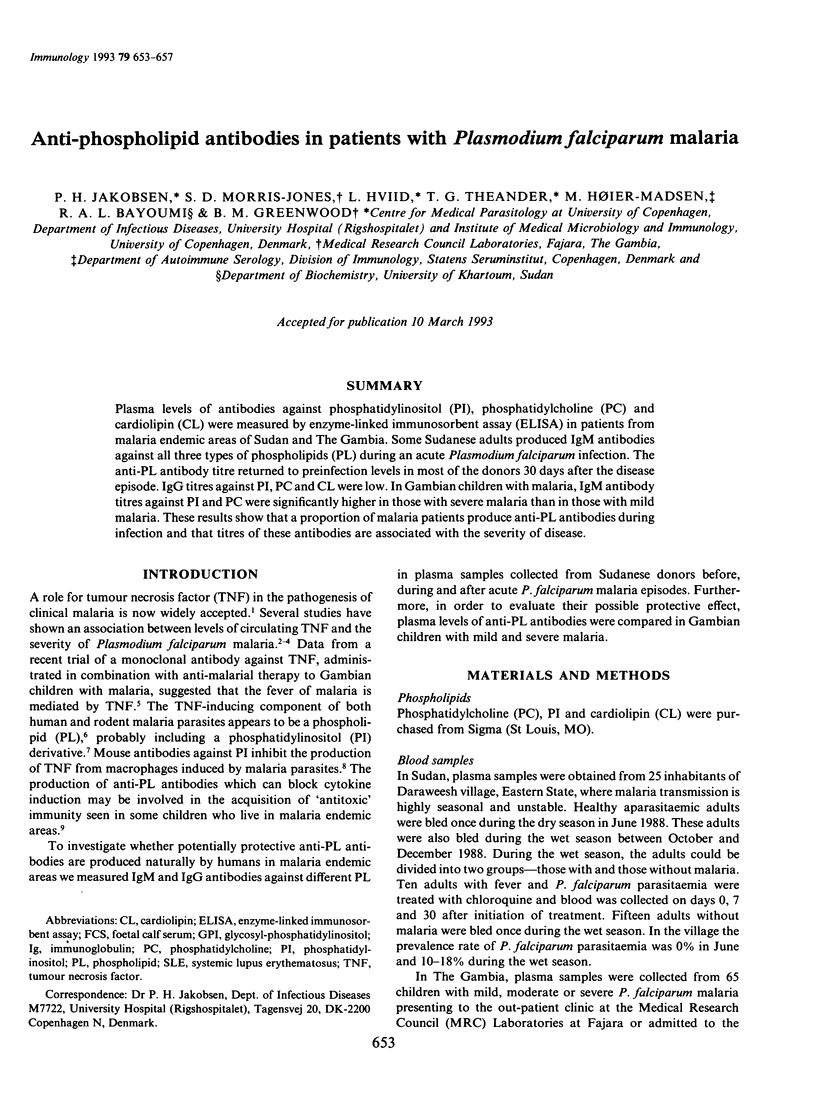
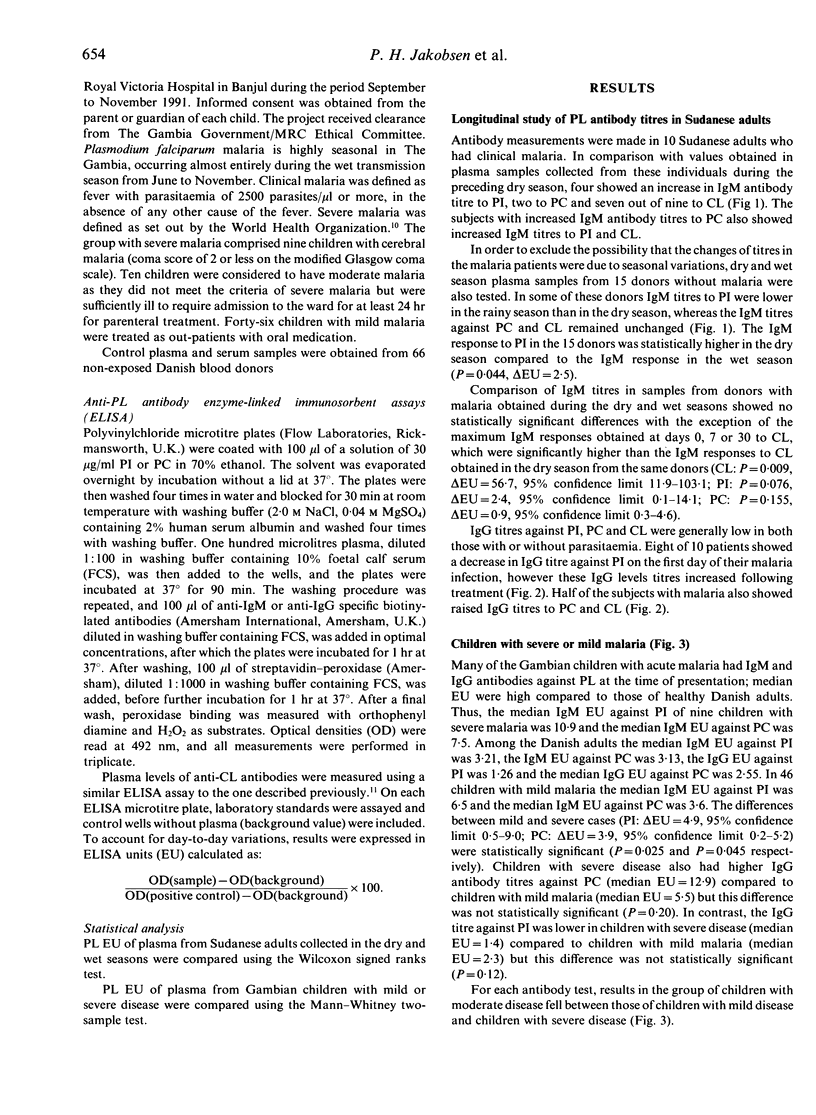
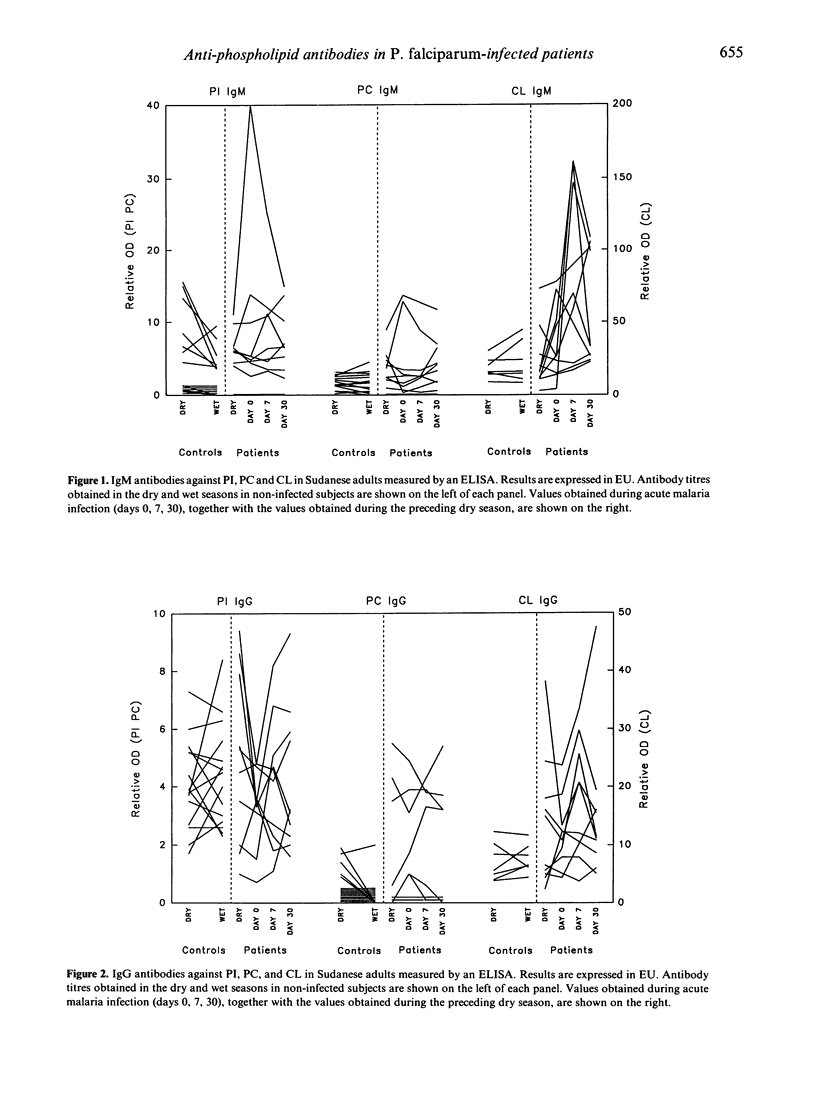
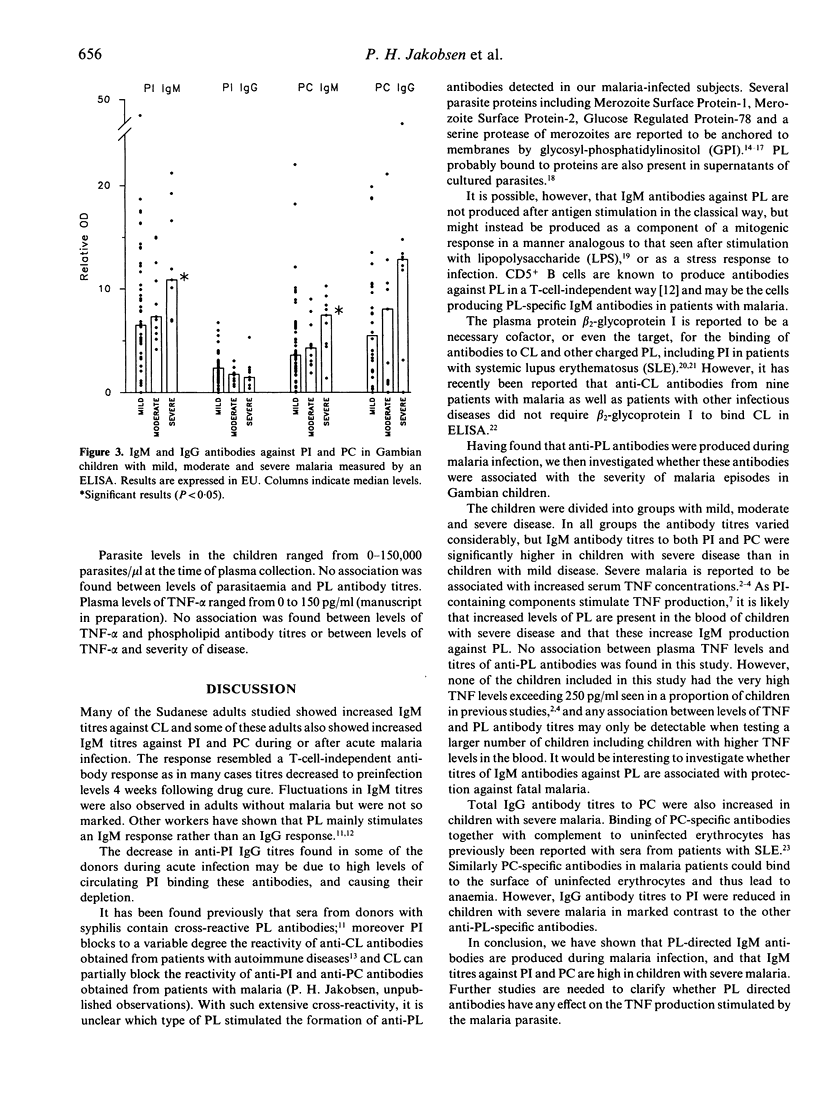
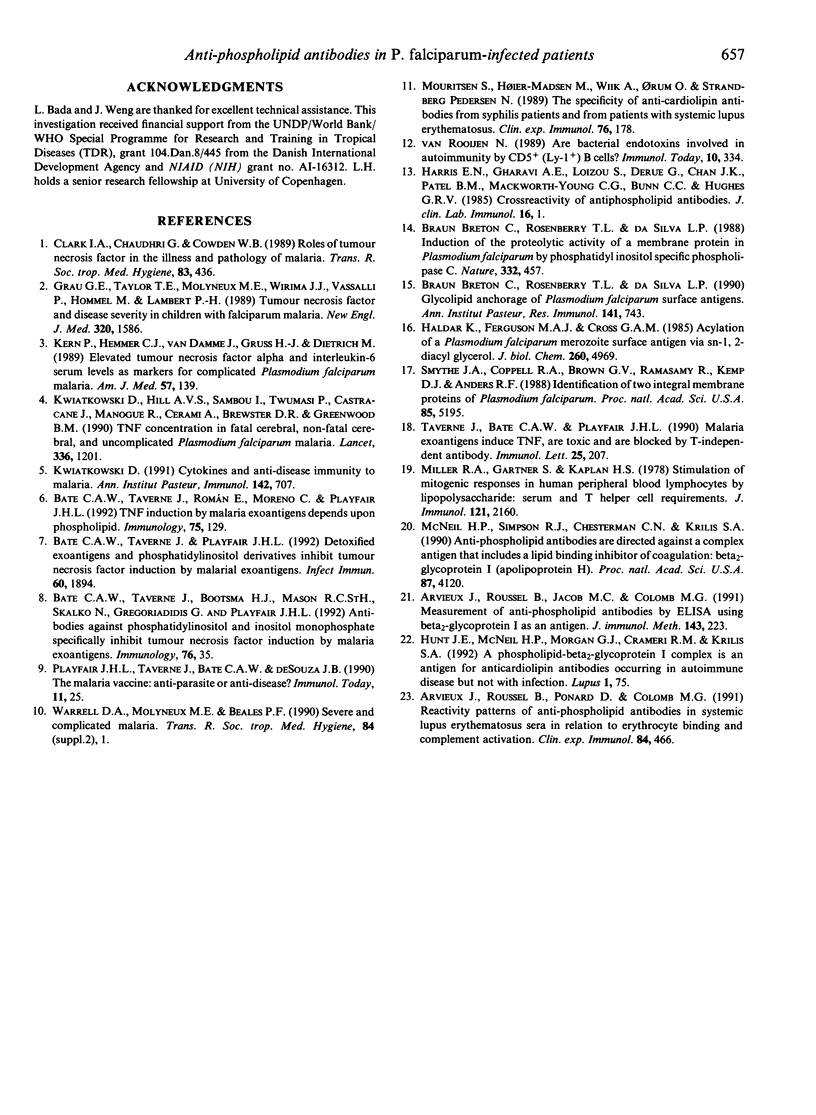
Selected References
These references are in PubMed. This may not be the complete list of references from this article.
- Arvieux J., Roussel B., Jacob M. C., Colomb M. G. Measurement of anti-phospholipid antibodies by ELISA using beta 2-glycoprotein I as an antigen. J Immunol Methods. 1991 Oct 25;143(2):223–229. doi: 10.1016/0022-1759(91)90047-j. [DOI] [PubMed] [Google Scholar]
- Arvieux J., Roussel B., Ponard D., Colomb M. G. Reactivity patterns of anti-phospholipid antibodies in systemic lupus erythematosus sera in relation to erythrocyte binding and complement activation. Clin Exp Immunol. 1991 Jun;84(3):466–471. [PMC free article] [PubMed] [Google Scholar]
- Bate C. A., Taverne J., Playfair J. H. Detoxified exoantigens and phosphatidylinositol derivatives inhibit tumor necrosis factor induction by malarial exoantigens. Infect Immun. 1992 May;60(5):1894–1901. doi: 10.1128/iai.60.5.1894-1901.1992. [DOI] [PMC free article] [PubMed] [Google Scholar]
- Bate C. A., Taverne J., Román E., Moreno C., Playfair J. H. Tumour necrosis factor induction by malaria exoantigens depends upon phospholipid. Immunology. 1992 Jan;75(1):129–135. [PMC free article] [PubMed] [Google Scholar]
- Braun Breton C., Rosenberry T. L., Pereira da Silva L. H. Glycolipid anchorage of Plasmodium falciparum surface antigens. Res Immunol. 1990 Oct;141(8):743–755. doi: 10.1016/0923-2494(90)90005-j. [DOI] [PubMed] [Google Scholar]
- Braun-Breton C., Rosenberry T. L., da Silva L. P. Induction of the proteolytic activity of a membrane protein in Plasmodium falciparum by phosphatidyl inositol-specific phospholipase C. Nature. 1988 Mar 31;332(6163):457–459. doi: 10.1038/332457a0. [DOI] [PubMed] [Google Scholar]
- Clark I. A., Chaudhri G., Cowden W. B. Roles of tumour necrosis factor in the illness and pathology of malaria. Trans R Soc Trop Med Hyg. 1989 Jul-Aug;83(4):436–440. doi: 10.1016/0035-9203(89)90240-x. [DOI] [PubMed] [Google Scholar]
- Grau G. E., Taylor T. E., Molyneux M. E., Wirima J. J., Vassalli P., Hommel M., Lambert P. H. Tumor necrosis factor and disease severity in children with falciparum malaria. N Engl J Med. 1989 Jun 15;320(24):1586–1591. doi: 10.1056/NEJM198906153202404. [DOI] [PubMed] [Google Scholar]
- Haldar K., Ferguson M. A., Cross G. A. Acylation of a Plasmodium falciparum merozoite surface antigen via sn-1,2-diacyl glycerol. J Biol Chem. 1985 Apr 25;260(8):4969–4974. [PubMed] [Google Scholar]
- Hunt J. E., McNeil H. P., Morgan G. J., Crameri R. M., Krilis S. A. A phospholipid-beta 2-glycoprotein I complex is an antigen for anticardiolipin antibodies occurring in autoimmune disease but not with infection. Lupus. 1992 Feb;1(2):75–81. doi: 10.1177/096120339200100204. [DOI] [PubMed] [Google Scholar]
- Kern P., Hemmer C. J., Van Damme J., Gruss H. J., Dietrich M. Elevated tumor necrosis factor alpha and interleukin-6 serum levels as markers for complicated Plasmodium falciparum malaria. Am J Med. 1989 Aug;87(2):139–143. doi: 10.1016/s0002-9343(89)80688-6. [DOI] [PubMed] [Google Scholar]
- Kwiatkowski D. Cytokines and anti-disease immunity to malaria. Res Immunol. 1991 Oct;142(8):707–712. doi: 10.1016/0923-2494(91)90154-b. [DOI] [PubMed] [Google Scholar]
- Kwiatkowski D., Hill A. V., Sambou I., Twumasi P., Castracane J., Manogue K. R., Cerami A., Brewster D. R., Greenwood B. M. TNF concentration in fatal cerebral, non-fatal cerebral, and uncomplicated Plasmodium falciparum malaria. Lancet. 1990 Nov 17;336(8725):1201–1204. doi: 10.1016/0140-6736(90)92827-5. [DOI] [PubMed] [Google Scholar]
- McNeil H. P., Simpson R. J., Chesterman C. N., Krilis S. A. Anti-phospholipid antibodies are directed against a complex antigen that includes a lipid-binding inhibitor of coagulation: beta 2-glycoprotein I (apolipoprotein H). Proc Natl Acad Sci U S A. 1990 Jun;87(11):4120–4124. doi: 10.1073/pnas.87.11.4120. [DOI] [PMC free article] [PubMed] [Google Scholar]
- Miller R. A., Gartner S., Kaplan H. S. Stimulation of mitogenic responses in human peripheral blood lymphocytes by lipopolysaccharide: serum and T helper cell requirements. J Immunol. 1978 Dec;121(6):2160–2164. [PubMed] [Google Scholar]
- Mouritsen S., Høier-Madsen M., Wiik A., Orum O., Strandberg Pedersen N. The specificity of anti-cardiolipin antibodies from syphilis patients and from patients with systemic lupus erythematosus. Clin Exp Immunol. 1989 May;76(2):178–183. [PMC free article] [PubMed] [Google Scholar]
- Playfair J. H., Taverne J., Bate C. A., de Souza J. B. The malaria vaccine: anti-parasite or anti-disease? Immunol Today. 1990 Jan;11(1):25–27. doi: 10.1016/0167-5699(90)90007-v. [DOI] [PubMed] [Google Scholar]
- Smythe J. A., Coppel R. L., Brown G. V., Ramasamy R., Kemp D. J., Anders R. F. Identification of two integral membrane proteins of Plasmodium falciparum. Proc Natl Acad Sci U S A. 1988 Jul;85(14):5195–5199. doi: 10.1073/pnas.85.14.5195. [DOI] [PMC free article] [PubMed] [Google Scholar]
- Taverne J., Bate C. A., Playfair J. H. Malaria exoantigens induce TNF, are toxic and are blocked by T-independent antibody. Immunol Lett. 1990 Aug;25(1-3):207–212. doi: 10.1016/0165-2478(90)90116-8. [DOI] [PubMed] [Google Scholar]
- van Rooijen N. Are bacterial endotoxins involved in autoimmunity by CD5+ (Ly-1+) B cells? Immunol Today. 1989 Oct;10(10):334–336. doi: 10.1016/0167-5699(89)90189-8. [DOI] [PubMed] [Google Scholar]


